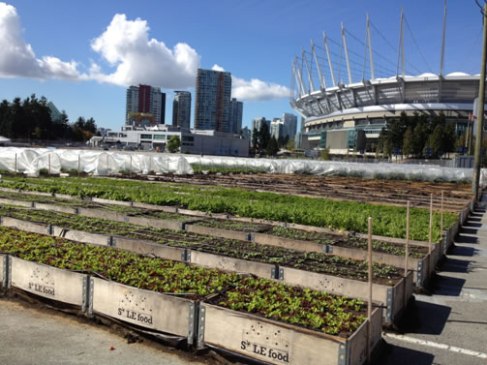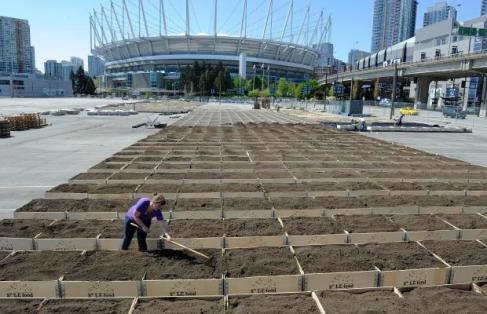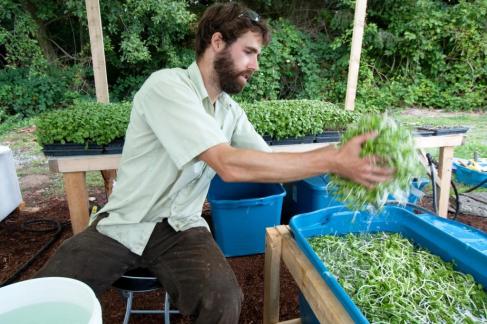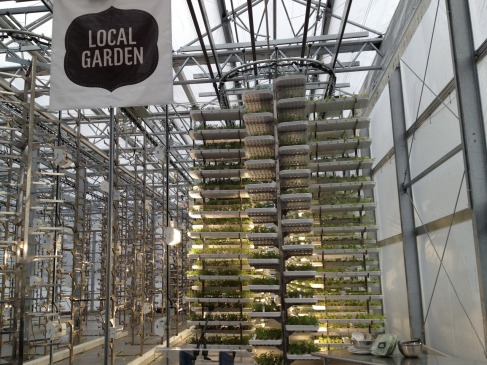Month: December 2013
VANCOUVER URBAN FARM
Walk along Pacific Boulevard to Carrall Street in Vancouver and you’ll see a garden growing in a concrete parking lot in the shadow of Rogers Arena. This is SOLEfood Urban Farm’s newest (and, at two acres, biggest) project – a sure sign that urban agriculture has reached Vancouver.
SOLEfood, which received a free three-year lease on the land from Concord Pacific Developments, has been growing bok choy, spinach, eggplant, kale, peppers, tomatoes, strawberries and other fruits and veggies in nearly 3,000 wooden planters since last May.
Once harvested, 10% of the produce will be donated to Downtown Eastside (DTES) organizations; the rest will be sold to restaurants and farmer’s markets and divided among members of SOLEfood’s community supported agriculture (CSA) program (find out how you can receive fresh, locally grown produce throughout the year here).
But SOLEfood grows more than food. It also creates jobs for people that may have trouble finding employment. With several more urban gardens in the works, the organization, which was founded by Michael Ableman and Seann Dory, plans to employ up to 25 Vancouver Downtown Eastside residents to build planters and care for the plants by the end of 2012.
– See more at: http://www.bikramyogavancouver.com/vancouver-community/solefood-urban-farm-vancouver/#sthash.gtWyFuSZ.dpuf
Urban Farming Series: edible sprout
One day last summer while wandering around UBC Farm, I spotted someone working on some platform beds covered in plastic, the likes of which I was not used to seeing.
Curiously I walked over to take a closer look. What I found was Chris Thoreau and his sunflower sprouts.
You may see Chris around the city at various farm markets selling his sprouts, but there is more to him and his company, My Urban Farm. Chris knows food. He has spent many years working in the restaurant industry as well as many more years teaching, learning and farming in Vancouver and Vancouver Island.
You may see Chris around the city at various farm markets selling his sprouts, but there is more to him and his company, My Urban Farm. Chris knows food. He has spent many years working in the restaurant industry as well as many more years teaching, learning and farming in Vancouver and Vancouver Island.
Chris and his My Urban Farm bring a wealth of knowledge into helping urbanites turn their land and yards into productive food systems – and he can do it with very little environmental impact. If you see Chris at the next farmer’s market, buy yourself a bag of sunflower sprouts and ask him what he can do to make your garden a great one.
Chris and his My Urban Farm bring a wealth of knowledge into helping urbanites turn their land and yards into productive food systems – and he can do it with very little environmental impact. If you see Chris at the next farmer’s market, buy yourself a bag of sunflower sprouts and ask him what he can do to make your garden a great one.
Tell us a little about your business, your background and how you decided to become an urban farmer?
My Urban Farm focuses on growing sunflower sprouts and pea shoots for local markets and restaurants. All production and deliveries are done by bicycle. Previous to this I operated a small organic farm on Vancouver Island. I am just finishing an Agroecology degree at UBC. Whilst attending UBC I still wanted to grow food and was thus obligated to be an urban farmer! So I developed this sprouting system to be portable and small-scale, yet still profitable. I am now in my second season.
What do you find are the advantages, disadvantages and challenges of urban farming (compared to small scale rural farming)?
Advantages: close to market, promotes local foods, reduced food miles, city water source
Disadvantages: usually requires multiple sites thus more travel time; hard to find land; land tenure unstable; pollution; vandalism
Challenges: Time management
What do you grow? What is your favourite plant/vegetable/fruit to grow? Why?
Sunflower Shoot and Pea Shoots. I like these as they grow on a quick ten-day cycle and can be grown just about anywhere. Plus no one else grows them!
When you harvest your produce, where do you sell it or what happens to it?
Farmers’ markets, CSAs, restaurants, grocers
What are your views on today’s food system?
Too commoditized; still too much focus on chemicals and GMO; we are all disconnected from our food
What are your hopes for the future of urban farming?
City makes more land available for farming; more grants for urban farmers
Finally, since this conversation is all about food, what is going to be on your dinner plate tonight?
Had urban zucchini stuffed with rice, currants, roasted sunflower seeds, and asiago cheese and steamed urban cauliflower shoots, my own sunflower sprouts, and farmers’ market biodynamic sauerkraut.
http://landwaterfork.com/urban-farming-series-my-urban-farm/
URBAN VERTICAL FARM OPENS IN VANCOUVER
First North American Urban Vertical Farm Opens in Vancouver!
Last month, the first commercial vertical farm in the world opened in Singapore. This week, Alterrous systems opened up its first vertical farm on top of a parkade in Vancouver. It feels like just yesterday that we were blogging about the initial stages of construction of the farm.
We couldn’t help but smile at the picture below of Vancouver mayor Gregor Robertson enjoying his first taste of vertically farmed produce.
Vancouver is well on its way achieving its goal of being the greenest city by 2020.
November 29th Edit: Please do not misunderstand what we mean by “First Vertical Farm in North America”. We have added “Urban” to that statement as we realize that it is misleading to say Local Garden is the first to grow crops vertically using hydroponics. Other businesses, such as Terrasphere have been growing certain crops on dense vertical shelving units in a suburb of Vancouver for years.
Locavores, look no further than the 10th floor of a downtown parkade for homegrown, leafy greens.
The first vertical urban farm in Vancouver – and in North America – harvested its first commercial crop of greens, kale, spinach, arugula and fresh herbs Tuesday from the rooftop of the Richard St. EasyPark.
The clean-tech farm is green, innovative, creates local jobs and occupies unused space, making it a “win-win” for Vancouver, Mayor Gregor Robertson said at the launch event.
Plus it lines the city’s pockets. Vancouver-based Alterrus Systems Inc. leased the underused parking space from the city at market rates and built the greenhouse with its own cash.
The $2-million, 6,000 square foot Local Garden, as the crops are branded, will employ between four to six people from Downtown Eastside organization Mission Possible.
The original VertiCrop system at the U.K.’s Paignton Zoo grows produce to feed animals, but this is Alterrus’ first attempt to sell to commercial markets.
It expects to produce 150,000 pounds of produce annually. The crops take about 20 days to grow and are rotated through the conveyor system to get maximum light exposure.
While the greens will be sold to those who can afford them, Alterrus is looking at opportunities to pay part of its lease fees in produce to contribute healthy food to city organizations, strategic advisor Donovan Wollard said.
Local restaurants and grocery stores such as Fable, Hawksworth, Spud.ca and Urban Fare want to buy the greens rather than ship the highly perishable items from as far as 2,000 kilometres away.







